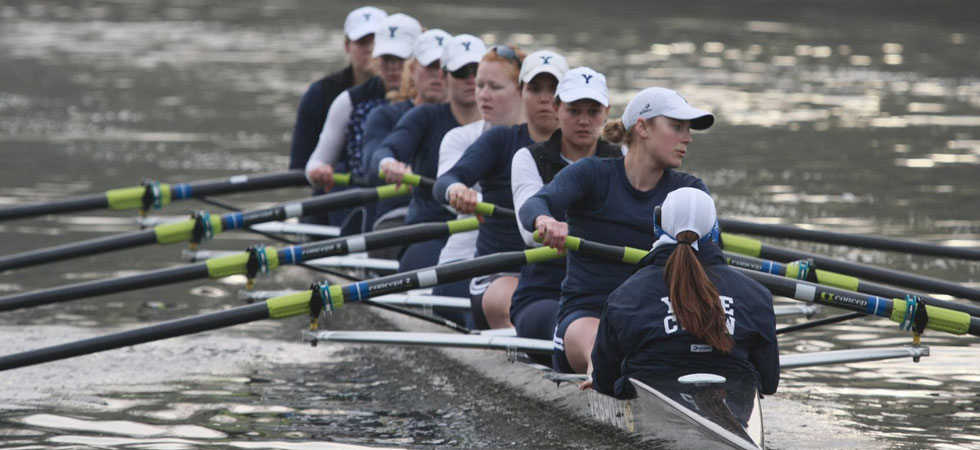
Courtesy of Yale Athletics
Yale sports teams implement a variety of approaches in managing interactions with the media, with some coaches providing specific guidelines for their athletes and others taking a more hands-off approach.
While many of Yale’s 35 varsity teams have a fairly unstructured policy for speaking with publications, some teams have more concrete protocols. Citing reasons ranging from representing the program fairly to avoiding negative publicity, coaches and athletes explained why they do or do not talk to campus or external publications.
The women’s crew team, for example, channels media interactions through veteran athletes who have more experience representing the program.
“We prefer all media questions be directed to our captain or a small group of seniors,” women’s crew head coach Will Porter said. “Seniors are better versed at communicating appropriately with the media. They have a strong sense of our team philosophy.”
Porter implemented this policy when he was hired as head coach in 1999 and has maintained it in his 18 years at the helm of the women’s crew program.
Women’s crew captain Kate O’Brien ’17, who often fields questions on behalf of athletes on her team, said the policy is a matter of practicality for a team with 39 members.
“Given we are such a large team, it tends to be easier to have all media interactions go through either myself or the head coaches,” O’Brien said. “There are no formal restrictions or anything of that nature. We have just found this method to make the most sense.”
In contrast, coaches of several other teams said they had no specific protocol mandating which team members should interact with the media. Women’s volleyball head coach Erin Appleman, heavyweight crew head coach Steve Gladstone and women’s soccer head coach Rudy Meredith all said they had not dictated specific policies for interacting with publications to their athletes.
And in past interactions with the News, coaches have explained their own reluctance to comment as a way to teach student-athletes to interact with members and to allow them to contribute to the team’s narrative.
Appleman, Gladstone, Meredith and Porter all emphasized the importance of demonstrating respect for the University when speaking with members of the media.
“I leave it up to the student-athletes themselves,” Appleman said. “I trust that they’re looking out for the program and being respectful of Yale and everything that they represent.”
According to outgoing women’s soccer captain Colleen McCormack ’17, student-athletes are briefed on media interactions at an orientation meeting at the start of the academic year in accordance with NCAA Compliance regulations, but for some teams, the discussion ends there.
Current women’s soccer captain Carlin Hudson ’18 said the media seldom crosses the mind of members of her team.
“A general statement we always tell our players is that anything they do is representative of Yale women’s soccer,” Hudson said. “Hopefully any media interactions are made with that in mind. I honestly have never thought about a media policy.”
Tori Shepherd ’17, outgoing volleyball captain, said that aside from a brief discussion about representing the program at the start of the year, her coaches generally step back and trust their athletes’ judgment throughout the rest of the season.
Some Yale coaches are more involved with ensuring their players represent their team off the field. Gladstone said he has sought to instill an attitude of caution towards online interactions on the heavyweight crew team.
“We have talked about the internet on more than one occasion,” Gladstone said. “What’s on the internet is public, so you need to be mindful of anything you put on social networks.”
In addition, members of Gladstone’s team take a more reserved approach to publicity. Garth Holden ’20, a member of the heavyweight crew team, said he and his teammates try to keep a low media profile, so they can focus on racing.
“We try to stay out of the public eye as much as we can for fear of losing focus or alerting other teams to our progress,” Holden said. “For this reason, we keep as much of what we do private as we can. As far as it is possible to do so, the coaches handle any and all media concerns to provide a buffer for the athletes, allowing us to focus on our training.”







